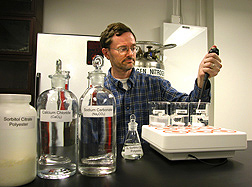This page has been archived and is being provided for reference purposes only. The page is no longer being updated, and therefore, links on the page may be invalid.
Read the magazine story to find out more. |
|
|
Cornstarch Yields Eco-Friendly Laundry Ingredient
By Jan SuszkiwApril 2, 2007
A new, environmentally friendly ingredient for laundry and dishwashing detergents is now in the works, thanks to the efforts of Agricultural Research Service (ARS) scientists, collaborating with the Birmingham, Ala., company Folia, Inc.
Under a four-year cooperative agreement, ARS scientists Randy Shogren and J.L. Willett have worked with Folia scientists and others to develop a detergent additive—called a "cobuilder"—which prevents the formation of crusty deposits known as "scale."
The new cobuilder ingredient is derived from cornstarch and is biodegradable.
In hard-water regions, scale can cause harm ranging from discolored clothing and cloudy dishes to diminished cooling and washer damage. Currently, the petroleum derivative polyacrylic acid is used. It improves cleaning power by "softening" water and keeping calcium carbonate from crystallizing. But polyacrylic acid isn't biodegradable, which raises the likelihood for this additive to accumulate in the environment, notes Shogren, a chemist. He and Willett, a chemical engineer, work at the ARS National Center for Agricultural Utilization Research in Peoria, Ill.
In studies there, Shogren and Willett researched ways to make a scale-fighting cobuilder that would be degradable by microbes in soil and water. That led to the use of two food-grade additives—citric acid and sorbitol—and a heat-based method of fusing them so that they would form polyester-based cobuilders.
In tests, solutions of calcium carbonate formed crystals within one minute. But adding the polyester-based cobuilder staved off crystal formation for 10 minutes. Although less polyacrylic acid was needed to do the same, it lacked the biodegradability of the polyester-based cobuilder.
The team's method of making the polyester cobuilders from citric acid and sorbitol avoids the use of costly solvents, which has restricted the sales of similar biodegradable detergent additives to niche markets. The team's focus now is scaling up production of the cornstarch-based polyester cobuilders. Folia is also sending product samples out for independent testing.
Read more about the work in the April 2007 issue of Agricultural Research magazine.
ARS is the U.S. Department of Agriculture's chief scientific research agency.

